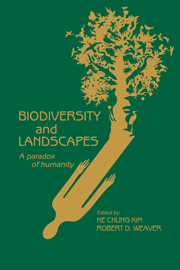Book contents
- Frontmatter
- Contents
- Contributors
- Preface
- Part I Introduction
- 1 Biodiversity and humanity: paradox and challenge
- Part II Human values and biodiversity
- Part III Human processes and biodiversity
- Part IV Management of biodiversity and landscapes
- Part V Socioeconomics of biodiversity
- Part VI Strategies for biodiversity conservation
- Part VII Biodiversity and landscapes: postscript
- Index
1 - Biodiversity and humanity: paradox and challenge
Published online by Cambridge University Press: 04 August 2010
- Frontmatter
- Contents
- Contributors
- Preface
- Part I Introduction
- 1 Biodiversity and humanity: paradox and challenge
- Part II Human values and biodiversity
- Part III Human processes and biodiversity
- Part IV Management of biodiversity and landscapes
- Part V Socioeconomics of biodiversity
- Part VI Strategies for biodiversity conservation
- Part VII Biodiversity and landscapes: postscript
- Index
Summary
Introduction
Biodiversity – the biotic basis of plants, animals, and microbes on the earth – is being reduced at an alarming rate, just at the time when we need it most for sustaining human life. The human destruction of this essential resource has become a major global issue and the 1992 Earth Summit at Rio de Janeiro (United Nations Conference on Environmental and Development) heightened this concern at the global level. The issue is a manifestation of a paradox that is central to technological society. Technological humanity, through both the magnitude of its populations and its actions, has caused an increasingly devastating effect on the stability of the earth system, which in turn affects all organisms and entire ecosystems, including humans themselves. This process also undermines the biosphere's capability to respond to changing environmental conditions and impairs options for human sustenance. Rapid destruction of biodiversity as a result of technological and other human activities threatens the integrity of ecosystems and landscapes; it also affects human enterprises, such as agriculture, development, and recreation. In other words, the loss of biodiversity actually constrains and counteracts economic development, which is the immediate goal of all nations of the world.
The Earth is no longer a world of distant lands and unfamiliar cultures. Our small blue planet has become crowded with 5.4 billion human inhabitants, increasingly homogenized by technological culture. No country is now insulated from global environmental and socioeconomic changes, and local/regional development activities cannot remain independent of each other. Exponential growth of the human population has occurred only for the last hundred years, reaching the 5.4 billion mark by 1992 – more than three times the barely 1.6 billion of 1900.
- Type
- Chapter
- Information
- Biodiversity and LandscapesA Paradox of Humanity, pp. 3 - 28Publisher: Cambridge University PressPrint publication year: 1994
- 4
- Cited by



